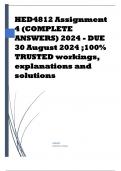Exam (elaborations)
HED4812 Assignment 4 (COMPLETE ANSWERS) 2024 - DUE 30 August 2024 ;100% TRUSTED workings, explanations and solutions.
- Institution
- University Of South Africa
HED4812 Assignment 4 (COMPLETE ANSWERS) 2024 - DUE 30 August 2024 ;100% TRUSTED workings, explanations and solutions. .......... 1. Indigenous and Traditional Leadership Principles and Practices (Marks: /10) • Reflect on how the study of indigenous and traditional leadership has influenced your u...
[Show more]



